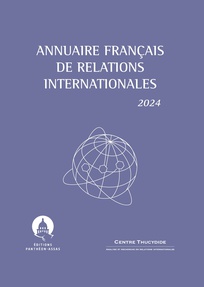Africa in their Words: A Study of Chinese Traders in South Africa, Lesotho, Botswana, Zambia and Angola
Terence McNamee with Greg Mills, Sebabatso Manoeli, Masana Mulaudzi, Stuart Doran and Emma Chen
The Brenthurst Foundation, Discussion Paper 2012/03
Présentation
The 'China in Africa' story brims with ambivalence and ambiguity. Nowhere is this more evident than on the African street. The influx of Chinese products and the proliferation of small Chinese enterprises are affecting ways of life in African towns and cities, but exactly how and to what extent is hotly contested. Their presence has sparked outbreaks of xenophobic violence, led to increased competition with local businesses and prompted calls for tougher regulation and government intervention. They have become the whipping boy for Africa's politicians, merchants and labour unions upset by Beijing's growing ties to the continent. However, Chinese traders have also afforded millions of African consumers the opportunity to purchase a range of goods for the first time. Whilst debate over their impact on Africa's development escalates, they have remained a largely unknown newcomer, scarcely understood and rarely examined.
This study is perhaps the first to investigate and compare the perceptions of Chinese traders in a systematic way, across several African countries. The Brenthurst Foundation conducted nearly 200 in-depth interviews with Chinese traders in five countries in Southern Africa - South Africa, Lesotho, Zambia, Botswana and Angola - between April 2011 and February 2012. This Discussion Paper distils the key findings of the interviews and, supplemented by additional research, considers inter alia why Chinese traders have proved so successful in Africa and what their experiences might tell us about the future of Chinese-African relations.
There is no reliable data on how many Chinese citizens are in Africa, although some estimates put the number at over one million. Of those, we know least about the Chinese migrants who are making a living as traders in rural areas and urban marketplaces across the length and breadth of the continent. They have forged their own pathways in Africa and are seemingly entirely divorced from the policies often associated with China's African interests. Yet the experiences of traders could weigh heavily on the future of Chinese-African relations, more so than even big business or high politics.
Overwhelmingly, Africans and Chinese meet, interact and explore each other's worlds on the street, at the grassroots level. By restricting our in-depth interviews to this sphere, numerous findings and insights not captured in the wider ‘China in Africa' narrative were exposed. At the most general level, this Paper reveals the complex and multi-layered nature of the Chinese presence in Africa, so frequently misrepresented as one great monolith. Although across the five countries examined in this study there are sharp differences in the opinions and perceptions of Chinese traders, it is the striking similarities that are most telling.
Africa is the bottom-rung destination for China's migrants. The continent draws the poorest and least educated of the Chinese diaspora. Nearly all are in Africa because they could not make a living in the pressure-cooker that has become China's job market. If they had a choice, they would be elsewhere, but only Africa possesses the minimal entry requirements and light regulations that enable Chinese migrants with limited capital and low levels of skills to compete. Still, only a tiny minority intend to make the continent their home. The vast majority of traders long to either return to China or resettle somewhere other than Africa. In one country in our survey, Lesotho, not a single interviewee definitely wished to remain in the country. In part this is due to issues such as rampant corruption, high crime and low quality of life which figured prominently in responses throughout our study. More and more, however, traders have become fearful of the rising tide of resentment amongst locals, fuelled by China's perceived dominance over many sectors of their respective economies. This was especially pronounced in Lesotho, Angola and Zambia, and less so but increasingly in Botswana.
This survey paints a bleak picture of the place of Chinese traders within African societies. Only in South Africa did traders express any sense of belonging or attachment to the country. Almost without exception, Chinese traders seal themselves in cocoons, completely cut off from local communities. Their experience suggests that, at least for now, it is pointless to even speculate on the prospects for deeper integration of Chinese migrants into African society. In some countries, just halting the rise of mutual suspicion and tension could prove a colossal task.
Yet this study also sheds light on the values and mind-set that have enabled Chinese traders to succeed where many others have failed or feared to tread. Their capacity to endure hardships and sacrifices to earn a living, not least long separations from their families, seems inestimable.
Evident throughout our interviews was also their abiding commitment to learning a new profession (only 1 in 5 had experience of trading back in China), often moving from the lowliest position in a workplace to owning a small business; a marked tolerance for risk, forging opportunities where none seemed to exist, where profit margins were minimal and supply chains weak; an ingrained sense that a person is nothing without a job and only hard work will prevent someone else from taking it; and a willingness to compete.
In the view of most Chinese traders, this mind-set is not shared or understood by the Africans who purchase their goods and work in their shops. Instead, traders feel besieged by charges that they are using illicit means to rob and cheat Africans, rather than simply out-compete them. In some countries, ill-will is clearly growing amongst their customers over the (poor) quality of some Chinese goods and shopkeepers' business practices, namely their refusal to respect consumer rights. As the clamour for action against Chinese traders intensifies, they will be less able to sidestep the contentious issues which surround their businesses, especially related to tax, imports and their failure to establish links with local firms and supply chains.
In some Southern African countries more than half of the traders come from just one province, Fujian, home to less than 3 per cent of China's total population. Networks in Fujian have been exceptional in creating opportunities that facilitate greater migration from China to African countries - both legally and illegally - yet Fujianese traders have been the source of considerable tension, not least amongst the wider Chinese migrant community, who are widely critical of their approach to business, if not their character.
Revealingly, traders often reserved their harshest comments for their putative guardians in African countries - Chinese diplomatic and consular officials. Ninety-five per cent of our survey claimed that they had never received assistance of any kind from their respective Chinese embassies. With rare exceptions, the perception of ‘Beijing' amongst them was extremely negative.
Should tensions continue to escalate over traders' activities in Africa's towns and cities, it will become harder for China to remain indifferent to their plight. Sooner or later, Beijing will have to define its relationship with Chinese traders in Africa. The large numbers of Chinese migrants living in volatile countries across the world, not least in Africa, could become China's Achilles Heel. The fear is that violence against Chinese migrants abroad could stoke nationalist reactions at home and threaten the country's unity. So the question arises from our study, might China be compelled to involve itself in the internal affairs of unstable or conflict-ridden countries, not least in Africa, to a far greater degree than hitherto? if so, then Chinese traders - the most vulnerable of China's migrants - could find themselves on the frontline of their country's foreign policy rather than the furthest margins.
The formidable obstacles Chinese traders have overcome to earn a living in Africa during the past decade, from insecurity and loneliness to language difficulties and xenophobia, are well documented in this Paper. As for the coming decade, the emergent challenges to their supremacy on the African street are likely to be even more arduous. Prominent among them are changing government policies, new market competitors and shifting dynamics within China. Despite the obvious drawbacks, however, life in Africa still makes economic sense for Chinese traders, at least for now. Research suggests that traders in Africa are making about three times what they might theoretically earn in China. That essential difference is where much of the Chinese trader phenomenon in Africa starts and stops.
Yet there is an acute precariousness to their existence in Africa that is not generally felt by Chinese migrants elsewhere. It may stem, in part, from the anxiety evident across Africa over whether the continent can address the manifold challenges that threaten its economic growth, such as high youth unemployment or an unexpected fall in commodity prices. Doubtless it also relates to the lowly place of Africa's Chinese traders in the wider Chinese diaspora: if they don't make it in Africa, they have nowhere else to go
Télécharger à http://www.thebrenthurstfoundation.org/files/brenthurst_commisioned_reports/Brenthurst-paper-201203-Africa-in-their-Words-A-Study-of-Chinese-Traders.pdf 











